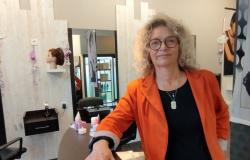Located between Grand Yoff and the Catchment Zone, the so-called “Catchment Zone” canal pollutes the lives of the populations and workers of these districts of Dakar. The place has become a Mbeubeuss (largest garbage dump in Dakar) in the heart of the Senegalese capital with its overflowing garbage and stagnant wastewater.
On this January morning, a chilly wind is blowing in Grand Yoff, precisely in the area called “Bignona”. A site that doesn’t look like much. It is made famous by the activity of selling pork meat. Incessant comings and goings are noted there throughout the day with the scene of butchers transporting pig carcasses and dumping the residue and other things into the canal opposite.
It is one of the most unhealthy places in Dakar. From the Bignona market to the canal, pollution and lack of hygiene have left their marks. At the door of the pig market, a lady is sitting. A suffocating smell rises to the nose and throat of the visitor. Aissatou Diallo watches for the slightest customer to sell his grilled potatoes. “I sell this to feed my family,” she says, before covering the bowl.
The smell of the canal is felt all the way there. A young mechanic, dressed in rags, believes that they are used to working in this environment without being bothered by the smell that the canal gives off. On the other side, in the Catchment Zone district, young washers are busy around the vehicles. None of them wear a mask. The cars are parked in front of the canal where these young people officiate. The vicious air that emanates from this strait does not seem to bother them at all. Saliou Tine, holding a bucket of water, a piece of fabric in the other hand, calmly washes a taxi.
“We do our best not to stay here until dark. Mosquitoes are very numerous because of the waste that is thrown into this canal. I also learned that some garbage trucks dump excrement in this place,” he reveals, not without emphasizing that the place is sometimes unbreathable at certain times. His colleague, Moussa Dione, agrees.
He confides that they are forced to come every day to breathe this nauseating air. Our interlocutor admits that they are aware of the risks of illness incurred there, but they cannot leave the place. Next to them, the “Boudiou men” (waste collectors) roam. Repairing his vehicle at the mechanics, Mamadou, in his fifties, confides that he rarely comes to this place because of this canal.
“There was even a garage for so-called “Timetable” buses leaving for Casamance on the other side. It was extraordinary because the drivers, drivers and apprentices stayed almost every day in this place, inhaling the nauseating odor that came from this canal. Ultimately, I think the town hall took over the space,” he explains. A local resident, Boubacar indicates that he has lived for several years in this neighborhood of the Catchment Zone. He emphasizes that they live with all the risks of diseases because of this canal. According to Boubacar, in his building, tenants almost never last.
“It’s the neighborhood that has the most mosquitoes in this country,” he said jokingly. The inhabitants of the Catchment Zone often complain about this canal which has become a dumping ground for garbage of all kinds, thus polluting life in the city.
Samba DIAMANKA





